The edible nuts market is estimated to be valued at USD 102.3 billion in 2025. It is projected to reach USD 218.8 billion by 2035, registering a compound annual growth rate (CAGR) of 7.9% over the forecast period. The market is projected to add an absolute dollar opportunity of USD 116.5 billion over the forecast period.
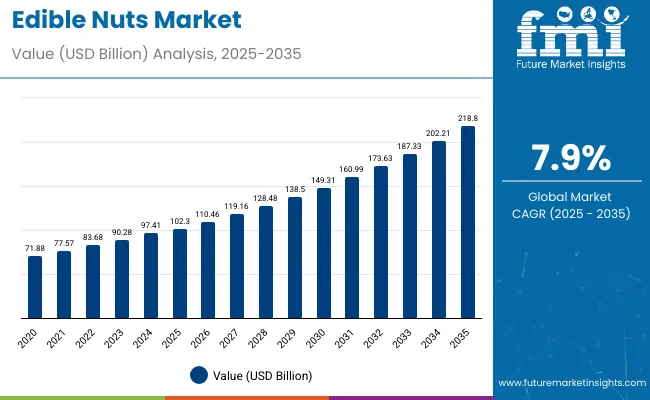
| Metric | Value |
|---|---|
| Estimated Size (2025E) | USD 102.3 billion |
| Projected Value (2035F) | USD 218.8 billion |
| CAGR (2025 to 2035) | 7.9% |
This reflects 2.14 times growth during the forecast period at a CAGR of 7.9%. The market's evolution is expected to be shaped by rising health consciousness, increasing awareness of nutritional benefits, and growing demand for plant-based protein sources, particularly where natural energy-dense foods and versatile culinary applications are required.
By 2030, the market is likely to reach USD 155.5 billion, accounting for USD 53.2 billion in incremental value over the first half of the decade. The remaining USD 63.4 billion is projected for the second half of the decade, indicating a moderately back-loaded growth pattern. Product innovation in organic formulations, flavored varieties, and convenient packaging formats is gaining traction due to edible nuts' superior nutritional profile and consumer preference for healthy snacking.
Companies such as Olam International Ltd and Archer Daniels Midland Company are advancing their competitive positions through investment in sustainable sourcing technologies and premium product formulations. Health-conscious lifestyle trends and plant-based diet adoption are supporting expansion into food service, retail, and ingredient supply applications. Market performance will remain anchored in quality standards, processing innovation, and supply chain sustainability benchmarks.
The market holds a significant share across its parent markets. Within the healthy snacks market, it accounts for 18.5% due to its nutritional density. In the plant-based protein segment, it commands a 12.8% share, supported by rising health consciousness. It contributes nearly 8.3% to the organic food market and 6.7% to the functional food ingredients category. In natural ingredient applications, edible nuts hold around 9.2% share, driven by their versatility in culinary applications. Across the premium food ingredients market, its share is close to 11.4%, owing to its use in gourmet culinary applications and artisanal products.
The market is undergoing a strategic transformation driven by rising demand for premium, health-conscious, and sustainable food solutions. Advanced processing technologies using cold-pressing, roasting innovations, and packaging improvements have enhanced shelf life, nutritional retention, and product convenience, making edible nuts viable alternatives to conventional processed snacks.
Manufacturers are introducing specialized formulations, such as organic varieties and flavored options tailored to specific dietary preferences, thereby expanding the role of edible nuts beyond basic snacking. Strategic collaborations between nut producers and food technology companies have accelerated innovation in product development and market penetration. Clean-label positioning and sustainable sourcing practices have widened consumer acceptance across diverse demographics, reshaping traditional snacking patterns and forcing conventional snack suppliers to diversify their portfolios.
Edible nuts' exceptional nutritional profile, high protein content, and versatile applications make them attractive food choices for health-conscious consumers and food manufacturers seeking premium, natural ingredient solutions. Their rich content of healthy fats, antioxidants, and essential nutrients appeals to consumers prioritizing heart-healthy and minimally processed food options.
Growing awareness of plant-based diets, ketogenic lifestyles, and Mediterranean dietary patterns is further propelling adoption, especially in premium retail, food service, and ingredient supply sectors. Rising disposable incomes, expanding e-commerce channels, and government initiatives supporting sustainable agriculture are also enhancing product accessibility and market penetration.
As health and wellness trends accelerate across demographics and premium positioning becomes critical, the market outlook remains favorable. With consumers and manufacturers prioritizing nutritional quality, sustainable sourcing, and functional benefits, edible nuts are well-positioned to expand across various culinary, snacking, and ingredient applications.
The market is segmented by product type, nature, form, end-use, distribution channel, and region. By product type, the market is divided into cashews, almonds, pistachios, peanuts, and chestnuts. By nature, the market is bifurcated into organic and conventional. Based on form, the market is categorized into whole (plain, roasted, salted), powder, and splits. By end-use, the market is bifurcated into food service industry and household. In terms of distribution channel, the market is segmented into store-based retailing, hypermarkets/supermarkets, convenience stores, specialty stores, and online retail. Regionally, the market is classified intoNorth America, Latin America, Europe, East Asia, South Asia & Pacific, the Middle East & Africa.
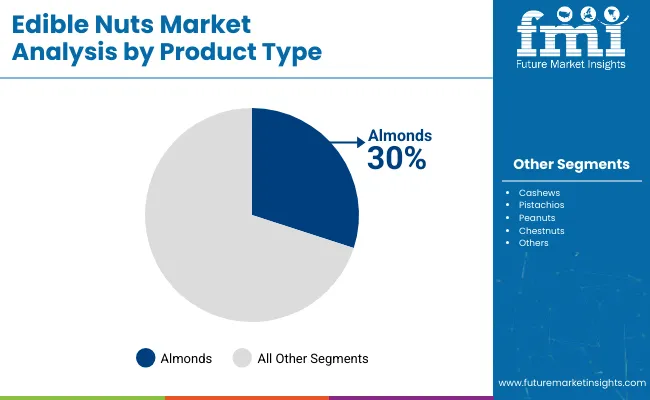
The almonds segment holds a dominant position with 30% of the market share in the product type category, owing to their superior nutritional profile, versatile culinary applications, and widespread consumer acceptance. Almonds are widely used in snacking, baking, and ingredient applications due to their high protein content, healthy fat composition, and antioxidant properties, which appeal to health-conscious consumers and food manufacturers alike.
They enable manufacturers and consumers to deliver premium nutritional value while maintaining taste appeal and versatility in culinary applications. As demand for plant-based protein, clean-label ingredients, and healthy snacking grows, almonds continue to gain preference across both retail and food service applications.
Manufacturers are investing in advanced processing technologies, quality control systems, and sustainable sourcing practices to enhance flavor profiles, shelf stability, and traceability. The segment is poised to expand further as global consumer preferences favor nutrient-dense, natural food options.
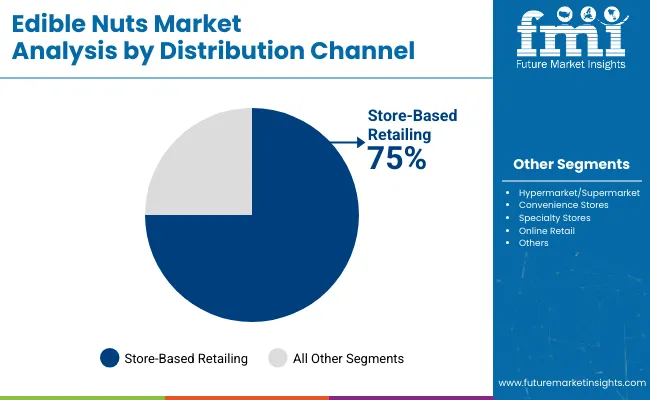
Store-based retailing remains the core distribution channel with 75% of the market share in 2025, as traditional retail channels provide accessibility, product visibility, and consumer trust in edible nuts purchasing decisions. Physical retail locations enable consumers to assess product quality, compare options, and benefit from promotional activities while maintaining established shopping patterns.
Store-based retailing also supports product education and brand building through in-store demonstrations, sampling programs, and strategic shelf placement. This makes it indispensable in maintaining market penetration and consumer engagement.
Ongoing expansion of specialty food retailers, health food stores, and premium grocery chains is a key trend driving the sustained relevance of store-based retailing in edible nuts distribution.
In 2024, global edible nuts consumption grew by 12% year-on-year, with Europe and North America accounting for significant shares. Applications include healthy snacking, ingredient formulations, and culinary preparations. Manufacturers are introducing specialized processing methods and organic variants that deliver superior nutritional profiles and consumer appeal.
Sustainable sourcing practices now support premium positioning. Health-conscious consumption trends and plant-based diet preferences support consumer confidence. Retailers increasingly offer ready-to-eat nut mixes with integrated flavor profiles to reduce preparation complexity.
Premium Health Positioning Accelerates Edible Nuts Demand
Food manufacturers and health-conscious consumers are choosing edible nuts to achieve superior protein content, enhance nutritional positioning, and meet demands for natural, nutrient-dense solutions. In nutritional testing, premium nuts provide up to 25% protein content, compared with 8–12% in conventional snacks.
Products formulated with edible nuts maintain nutritional integrity throughout extended shelf-life cycles. In ready-to-consume formats, premium nut mixes help reduce preparation time while maintaining health benefits by up to 40%. Edible nuts applications are now being deployed for organic certification, increasing adoption in sectors demanding natural nutrition enhancement. These advantages help explain why edible nuts adoption rates in health food retail rose 35% in 2024 across developed markets.
Supply Chain Constraints, Price Volatility and Climate Dependency Limit Growth
Market expansion faces constraints due to raw material price volatility, limited processing capacity, and weather-dependent agricultural production. Raw nut costs range between USD 2.50 and USD 8.00 per pound, depending on seasonal and regional supply conditions. These fluctuations impact pricing and can cause supply disruptions of up to 15% in commercial applications.
Specialized processing and quality control standards add 4 to 6 weeks to product development cycles. Climate change impacts and sustainability requirements extend sourcing costs by 20-25% compared to conventional agricultural products. Limited availability of organic certified nuts restricts scalable premium production. These constraints make edible nuts adoption challenging in price-sensitive markets despite growing health benefits and commercial interest.
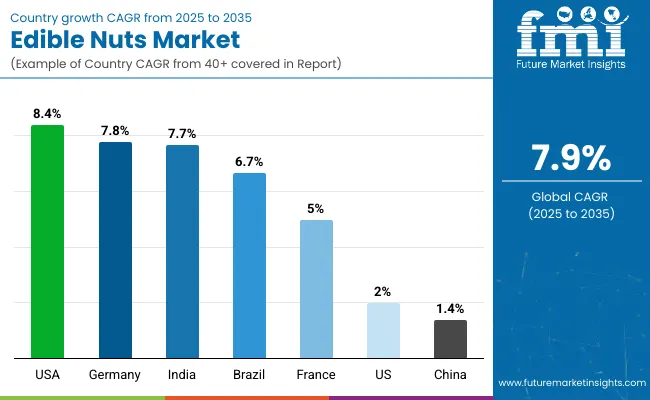
| Countries | CAGR (2025 to 2035) |
|---|---|
| UK | 8.4% |
| Germany | 7.8% |
| India | 7.7% |
| Brazil | 6.7% |
| France | 5.0% |
| USA | 2.0% |
| China | 1.4% |
In the edible nuts market, the UK leads with the highest projected CAGR of 8.4% from 2025 to 2035, driven by premium health food adoption and organic product demand. Germany follows with a CAGR of 7.8%, supported by established organic food markets and sustainability preferences. India shows strong growth at 7.7%, benefiting from cultural nut consumption traditions and rising disposable incomes. Brazil demonstrates growth at 6.7%, supported by domestic production advantages and export market development. France shows moderate growth at 5.0%, driven by gourmet food applications and premium positioning. The US shows lower growth at 2.0%, reflecting market maturity, while China, at 1.4% experiences constrained growth due to established consumption patterns, reflecting regional differences in market development stages.
The report covers an in-depth analysis of 40+ countries; seven top-performing OECD countries are highlighted below.
Revenue from edible nuts in the UK is projected to grow at a CAGR of 8.4% from 2025 to 2035, significantly exceeding the global average. Growth is fueled by rising health consciousness, organic food adoption, and premium snacking trends across major urban centers, including London, Manchester, and Edinburgh. British consumers are increasingly embracing healthy alternatives as lifestyle diseases become more prevalent and disposable incomes support premium product purchases. Specialty retail channels and health food stores are driving market penetration.
The edible nuts market in Germany is anticipated to expand at a CAGR of 7.8% from 2025 to 2035, exceeding the global rate significantly. Growth is centered on sustainability-conscious consumer segments and organic food applications in Berlin, Munich, and Hamburg regions. Advanced organic certification standards and sustainable sourcing practices are being deployed for premium retail, health food stores, and specialty applications. EU regulations and organic standards support the practical development of edible nuts across diverse consumer markets.
Sales of edible nuts in India are slated to flourish at a CAGR of 7.7% from 2025 to 2035, reflecting strong domestic consumption patterns. Growth has been concentrated in urban market expansion and traditional consumption growth in the Mumbai, Delhi, and Bangalore regions. Adoption of edible nuts is expanding from conventional festival use toward mainstream daily consumption and health-conscious snacking. Cultural significance and competitive domestic pricing lead commercial deployment strategies. Regional processing technology partnerships have strengthened, with increased collaboration between Indian producers and international quality standards companies.
Demand for edible nuts in Brazil is expected to increase at a CAGR of 6.7% from 2025 to 2035, supported by domestic production advantages and export market development. Demand is driven by health-conscious consumption growth and premium snacking applications in São Paulo, Rio de Janeiro, and Belo Horizonte markets. Health-conscious consumers and food manufacturers are increasingly adopting nuts for nutritional positioning and product differentiation. Domestic production capacity and competitive pricing support broader market accessibility.
Revenue from edible nuts in France is projected to rise at a CAGR of 5.0% from 2025 to 2035, supported by strong demand for gourmet applications and artisanal food preparations. Urban markets like Paris, Lyon, and Marseille are experiencing continued demand for premium ingredients, clean-label formulations, and Mediterranean diet adoption. Domestic food companies are leveraging nuts to meet quality expectations for haute cuisine and premium-positioned products.
The edible nuts market in the USA is expected to grow at a CAGR of 2.0% from 2025 to 2035, reflecting market maturity characteristics. Growth is driven by health-conscious segments and premium product positioning in California, Texas, and New York regions. Organic certification and specialty processing are expanding accessibility, while food manufacturers incorporate nuts into health-oriented products. Market saturation and established consumption patterns maintain moderate growth levels. Market development focuses on value-added products and specialty applications, supported by established supply chains and processing infrastructure.
Demand for edible nuts in China is projected to expand at a CAGR of 1.4% from 2025 to 2035, reflecting market maturity and established consumption patterns. Growth is concentrated in tier-1 cities, including Beijing, Shanghai, and Shenzhen, where health awareness and premium positioning are developing. Traditional consumption patterns and price sensitivity restrict broader premium market penetration, while consumer education initiatives maintain steady demand. Established supply chains and processing capabilities support market stability, targeting established urban consumer bases.
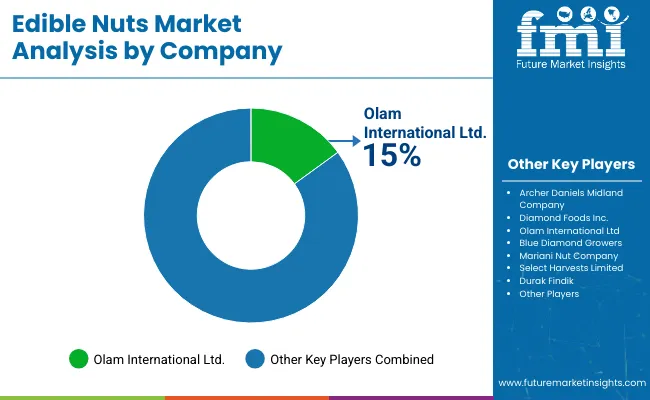
The market is moderately consolidated, featuring a mix of global agricultural processors, established nut specialists, and regional producers with varying degrees of sourcing capabilities, processing technology, and distribution expertise. Olam International Ltd leads with an estimated 15% market share, leveraging comprehensive global sourcing networks, processing facilities, and established relationships with major food manufacturers and retailers. Their strength lies in vertical integration across the supply chain and multi-category nut expertise.
Archer Daniels Midland Company and Blue Diamond Growers differentiate through specialized processing capabilities, cooperative structures, and application-specific product development that cater to both consumer and industrial segments. Diamond Foods Inc. and The Wonderful Company LLC focus on brand building, premium positioning, and direct-to-consumer marketing strategies, addressing growing demand from health-conscious consumers and specialty food applications.
Regional specialists emphasize processing innovation, sustainable sourcing practices, and quality certification systems, creating value in premium retail markets and specialized culinary applications.
Entry barriers remain significant, driven by challenges in supply chain integration, processing technology, and compliance with food safety and quality standards across multiple application categories. Competitiveness increasingly depends on sourcing efficiency, product differentiation capabilities, and market access expertise for diverse consumer and industrial manufacturing environments.
| Items | Value |
|---|---|
| Quantitative Units (2025) | USD 102.3 billion |
| Product Type | Cashews, Almonds, Pistachios, Peanuts, Chestnuts |
| Nature | Organic and Conventional |
| Form | Whole (Plain, Roasted, Salted), Powder, Splits |
| End-Use | Food Service Industry, Household |
| Distribution Channel | Store-Based Retailing, Hypermarkets/Supermarkets, Convenience Stores, Specialty Stores, Online Retail |
| Regions Covered | North America, Latin America, Europe, East Asia, South Asia & Pacific, Middle East & Africa |
| Countries Covered | United States, Canada, United Kingdom, Germany, France, China, Japan, South Korea, Brazil, Australia, India and 40+ Countries |
| Key Companies Profiled | Archer Daniels Midland Company, Diamond Foods Inc., Olam International Ltd, Blue Diamond Growers, Mariani Nut Company, Select Harvests Limited, Durak Findik, Grower Direct Nut Co. Ltd, Sun-Maid Growers of California, Hines Nut Company, John B. Sanfilippo & Son, Borges Agricultural & Industrial Nuts, The Wonderful Company LLC, Germack Pistachio Company, Nichols Farms, Setton Pistachio of Terra Bella Inc. |
| Additional Attributes | Dollar sales by product type and nature, regional demand trends, buyer preferences for raw, roasted, or flavored formats, integration with clean-label positioning and nutritional profiling, Innovations in roasting, coating, and packaging techniques for improved flavor, shelf-life, and functional properties |
The global edible nuts market is estimated to be valued at USD 102.3 billion in 2025.
The market size for edible nuts is projected to reach USD 218.8 billion by 2035.
The edible nuts market is expected to grow at a 7.9% CAGR between 2025 and 2035.
The almonds segment is projected to lead the edible nuts market with a 30% market share in 2025.
In terms of distribution, store-based retailing is expected to command a 75% share in the edible nuts market in 2025.






Our Research Products

The "Full Research Suite" delivers actionable market intel, deep dives on markets or technologies, so clients act faster, cut risk, and unlock growth.

The Leaderboard benchmarks and ranks top vendors, classifying them as Established Leaders, Leading Challengers, or Disruptors & Challengers.

Locates where complements amplify value and substitutes erode it, forecasting net impact by horizon

We deliver granular, decision-grade intel: market sizing, 5-year forecasts, pricing, adoption, usage, revenue, and operational KPIs—plus competitor tracking, regulation, and value chains—across 60 countries broadly.

Spot the shifts before they hit your P&L. We track inflection points, adoption curves, pricing moves, and ecosystem plays to show where demand is heading, why it is changing, and what to do next across high-growth markets and disruptive tech

Real-time reads of user behavior. We track shifting priorities, perceptions of today’s and next-gen services, and provider experience, then pace how fast tech moves from trial to adoption, blending buyer, consumer, and channel inputs with social signals (#WhySwitch, #UX).

Partner with our analyst team to build a custom report designed around your business priorities. From analysing market trends to assessing competitors or crafting bespoke datasets, we tailor insights to your needs.
Supplier Intelligence
Discovery & Profiling
Capacity & Footprint
Performance & Risk
Compliance & Governance
Commercial Readiness
Who Supplies Whom
Scorecards & Shortlists
Playbooks & Docs
Category Intelligence
Definition & Scope
Demand & Use Cases
Cost Drivers
Market Structure
Supply Chain Map
Trade & Policy
Operating Norms
Deliverables
Buyer Intelligence
Account Basics
Spend & Scope
Procurement Model
Vendor Requirements
Terms & Policies
Entry Strategy
Pain Points & Triggers
Outputs
Pricing Analysis
Benchmarks
Trends
Should-Cost
Indexation
Landed Cost
Commercial Terms
Deliverables
Brand Analysis
Positioning & Value Prop
Share & Presence
Customer Evidence
Go-to-Market
Digital & Reputation
Compliance & Trust
KPIs & Gaps
Outputs
Full Research Suite comprises of:
Market outlook & trends analysis
Interviews & case studies
Strategic recommendations
Vendor profiles & capabilities analysis
5-year forecasts
8 regions and 60+ country-level data splits
Market segment data splits
12 months of continuous data updates
DELIVERED AS:
PDF EXCEL ONLINE
Demand for Edible Nuts in EU Size and Share Forecast Outlook 2025 to 2035
Edible Oil Cans Market Size and Share Forecast Outlook 2025 to 2035
Edible Shrink Tunnel Systems Market Analysis - Size and Share Forecast Outlook 2025 to 2035
Edible Animal Fat Market Size and Share Forecast Outlook 2025 to 2035
Edible Water Pods Market Size and Share Forecast Outlook 2025 to 2035
Edible Cups Market Size and Share Forecast Outlook 2025 to 2035
Edible Beauty Infusions Market Analysis - Size, Share, and Forecast Outlook 2025 to 2035
Edible Collagen Casing Market Size and Share Forecast Outlook 2025 to 2035
Edible Seaweed Market Analysis - Size, Share, & Forecast Outlook 2025 to 2035
Edible Oils and Fats Market Analysis by Product Type, Source, and Distribution Channel Through 2035
Edible Films and Coatings Market Growth - Trends & Forecast 2025 to 2035
Edible Oil Packaging Market Growth - Demand & Forecast 2025 to 2035
Market Share Breakdown of Edible Films and Coatings
Competitive Overview of Edible Collagen Casing Market Share
Competitive Landscape of Edible Flakes Providers
Industry Share Analysis for Edible Offal Providers
Edible Packaging Market Report – Key Trends & Forecast 2024-2034
Edible Fungus Market Outlook – Growth, Demand & Forecast 2024 to 2034
Edible and Soluble Films Market
Organic Edible Oil Market Analysis by Type, Distribution Channel, and Region Through 2035

Thank you!
You will receive an email from our Business Development Manager. Please be sure to check your SPAM/JUNK folder too.
Chat With
MaRIA